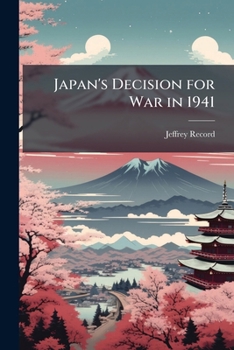Japan's Decision for War in 1941
The author takes a fresh look at Japan's decision for war in 1941, and concludes that it was dictated by Japanese pride and the threatened economic destruction of Japan by the United States. He believes that Japanese aggression in East Asia was the root cause of the Pacific War, but argues that the road to war in 1941 was built on American as well as Japanese miscalculations and that both sides suffered from cultural ignorance and racial arrogance. He finds that the Americans underestimated the role of fear and honor in Japanese calculations and overestimated the effectiveness of economic sanctions as a deterrent to war, whereas the Japanese underestimated the cohesion and resolve of an aroused American society and overestimated their own martial prowess as a means of defeating U.S. material superiority. He believes that the failure of deterrence was mutual, and that the descent of the United States and Japan into war contains lessons of great and continuing relevance to American foreign policy and defense decisionmakers.
This work has been selected by scholars as being culturally important, and is part of the knowledge base of civilization as we know it. This work was reproduced from the original artifact, and remains as true to the original work as possible. Therefore, you will see the original copyright references, library stamps (as most of these works have been housed in our most important libraries around the world), and other notations in the work.
This work is in the public domain in the United States of America, and possibly other nations. Within the United States, you may freely copy and distribute this work, as no entity (individual or corporate) has a copyright on the body of the work.
As a reproduction of a historical artifact, this work may contain missing or blurred pages, poor pictures, errant marks, etc. Scholars believe, and we concur, that this work is important enough to be preserved, reproduced, and made generally available to the public. We appreciate your support of the preservation process, and thank you for being an important part of keeping this knowledge alive and relevant.





